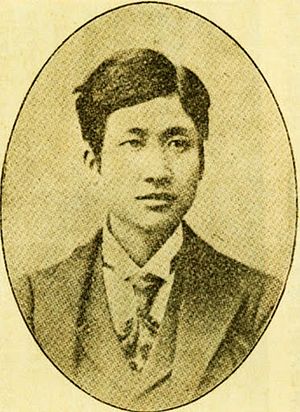Views
Dí Chǔqīng 狄楚青 (c. 1873-1941)
|
| Notable Associates: |
Dí Chǔqīng 狄楚青 (c. 1873-1941)[1] was a scholar of New Learning associated with the political reforms of 1898, author and co-founder of the newspaper Shíbào 時報, a lay Buddhist and publisher of Buddhist texts.
Biography
The location and exact date of Dí's birth remain unknown. He was a recipient of the Jǔrén 舉人 degree, and studied in Japan along with Kāng Yǒuwéi 康有為. After a brief and unsuccessful return to China where he attempted to raise money for the Imperial military, he returned to Japan where he began to publish articles. In 1904 he, Kāng Yǒuwéi and Liáng Qǐchāo 梁啟超 collaborated to found the periodical Shíbào 時報 in Shànghǎi, seeing publishing an as essential engine of reform. Also in 1904 Dí founded Yǒuzhèng Press 有正書局, which would later publish the periodical Buddhist Miscellany 佛學叢報. In 1921 the Shíbào and Yǒuzhèng offices moved in together to a building on the corner of Fuzhou and Shandong roads, in the heart of the Shànghǎi publishing district.
In middle age he began to turn to Buddhism, reportedly because of the influence of his wife, Wàng Guāndìng 汪觀定. He took refuge under Chan Master Yěkāi 冶開禪師 in Tiānníng Temple 天寧寺, Chángzhōu 常州. In 1914 he hosted Yuèxiá 月霞 during the latter's visit to Shànghǎi, supporting a lecture series that later led to the foundation of Huáyán University 華嚴大學.
Dí served on the board of Shànghǎi Buddhist Books 上海佛學書局, which was established in 1929. In 1931 he helped with the production of the Qìshā Canon 磧砂藏.
| This section is incomplete and more content needs to be added. You can help by contributing text, images, or suggestions. |
Notes
- ↑ Some sources give 1939 as his date of death. An article in MFQB 61:282 reporting on his death, however, is dated 1941.
References
- 狄楚青居士
- Fóguāng Dictionary Editing Committee 佛光大辭典編修委員會, Fóguāng dàcídiǎn 佛光大辭典 (Foguang Dictionary) (Gāoxióng county 高雄縣: Fóguāng chūbǎnshè 佛光出版社, 1988), p. 2983.
- Dí Bǎoxián 狄葆賢. Píngděnggé bǐjì 平等閣筆記. 4 fascicles 卷. 1922. Reprinted in Xiàndài fóxué dàxì 現代佛學大系, Vol. 48. Xīndiàn, Táiwān: Mílè chūbǎnshè, 1984.
